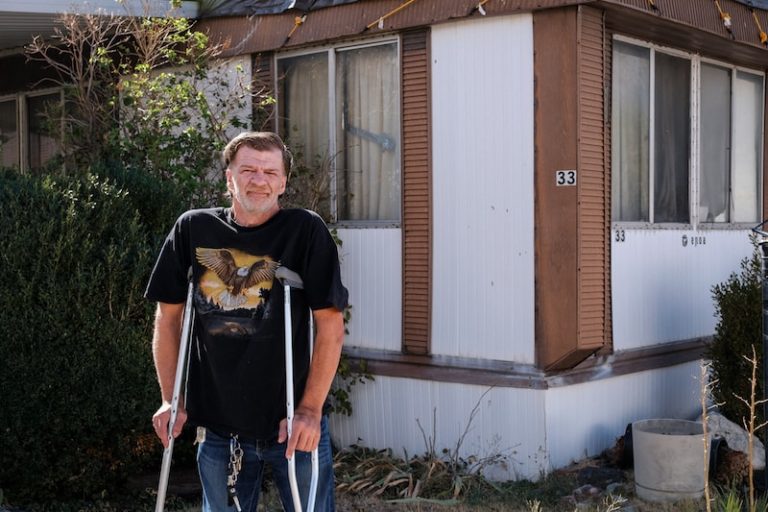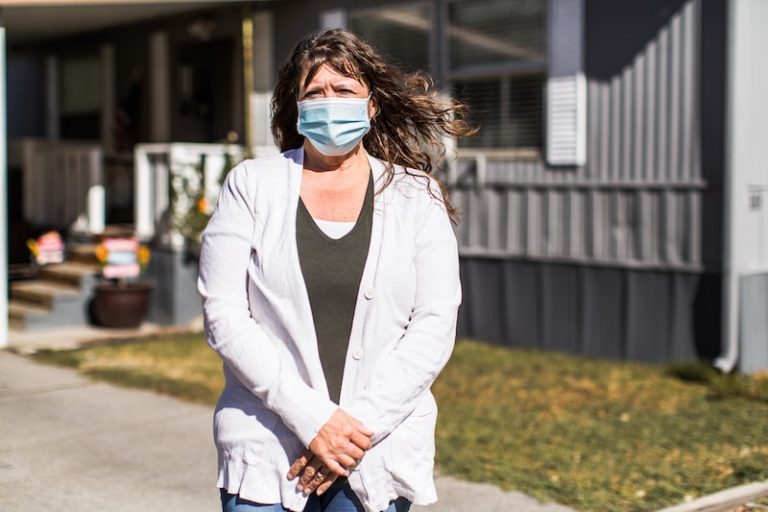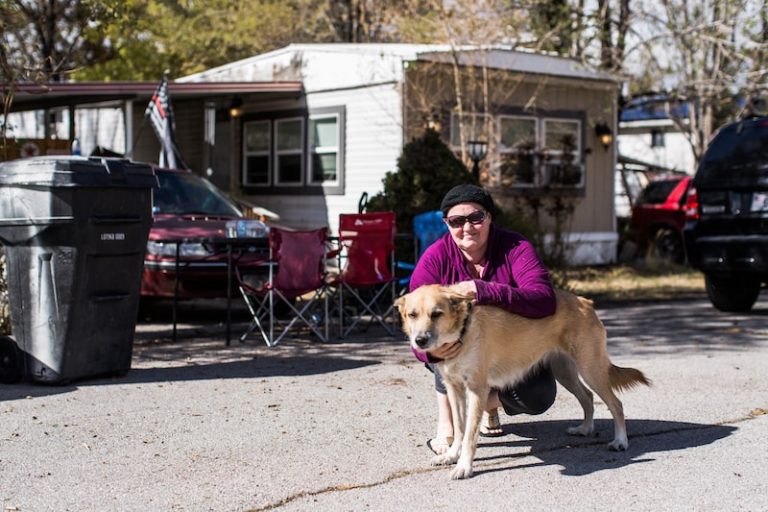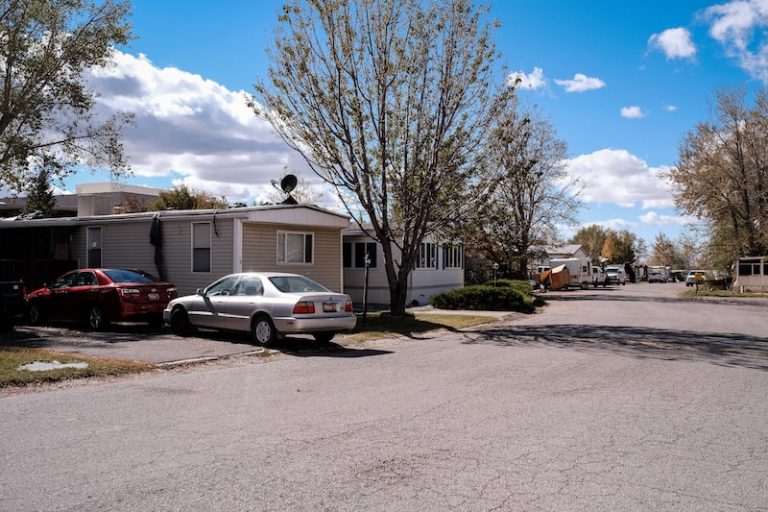
Centerville Mobile Estates has been home for Dennis Tireman, an army veteran, for nearly half a century. His home was paid for and life was good in the Davis County community at 555 N 400 W, near Interstate 15.
Casey Nielsen, who has lived at the trailer park for six years, also owns his home free and clear, and put $10,000 into fixing it up. “It’s a nice little home for me,” he said. “This has been my haven.”
A newer resident, Jennifer Pace, a single mother of two, spent two months and more than $15,000 renovating a double-wide she bought in April 2019. She felt good about the location (her parents live a block away and her grandparents also live in Centerville) and the $250 monthly rent for her space at the park.
Even when she and the other residents received a written notice on their doors that rent was going up, Pace was still happy she had moved to the park because of a sentence at the bottom of the paper saying, “we look forward to having you here for many more years.”
“We felt good about our choice then,” Pace said.

But last March, the 45 households received letters from Centerville Mobile Estates saying the land had been sold and they had nine months to vacate. The buyer, CW Land Co., a Centerville-based company, had contracted to buy the 6.6-acre site and plans to build a development that includes duplexes, townhomes, racquetball and tennis courts and green space.
The residents have until Jan. 4, 2021, to leave. CW Land offered $2,000 to those who vacated the property by October 15.
Many residents say a few thousand dollars is not nearly enough to cover relocation costs. Trailers can be expensive to relocate and many residents say a few thousand dollars is not nearly enough to cover relocation costs. In addition, mobile homes manufactured before June 15, 1976, do not meet federal Housing and Urban Development Department standards so other trailer parks will not accept them.
Adding to the residents’ stress are the COVID-19 pandemic and the economic downturn, which caused some to lose their jobs.
Some residents hoped Centerville would intervene, but the city doesn’t have any jurisdiction over a private sale or development plans as long as the owners comply with zoning and building regulations, according to Cory Snyder, community development director. In July, residents protested outside CW offices, demanding that the sale be called off.
“All of these trailers are too old to be moved, so pretty much they are taking our homes from us and giving us $2,000,” Pace said.

She added that there are veterans, elderly people and single mothers “who can’t afford to live in Centerville, let alone anywhere, on their incomes right now. Some have already moved out and some are still wondering what to do. We don’t believe that CW is going to compensate us for what our trailers are appraised for.”
For a short time, it looked like the residents might get a reprieve. Rulon Harrison, one of the siblings who owned the park, said he had not given permission for the sale and was concerned about what would happen to the residents. The Centerville Mobile Estates LLC owners, and CW Land representatives, held a mediation a few days after the protest to resolve the dispute.
The parties reached an agreement that the sale would go through on October 13 as scheduled, and CW Land would set up a fund to help out the residents. A third-party will decide, based on the residents’ individual circumstances, how much assistance each will receive. Every household is guaranteed the $2,000, regardless of whether the trailer is moved or left on the property. The two sides are not saying how much money will be distributed.
During this process, the primary concern of Centerville Mobile Estates (CME) has been the well-being of the park residents, attorney Jordan Bledsoe, who represents Rulon Harrison, said.
“CME appreciates CW Development Group’s willingness to participate in this process in good faith and to go above and beyond what is legally required to assist the residents,” Bledsoe said in an email.
In a written statement, Darlene Carter, president of CW Urban, a subsidiary of the CW Group, said, “we are sensitive to the plight of the residents who will need to relocate.”
The statement continues, “We realize the seriousness of the situation and, following our purchase of the real property, we will be fully committed to assisting the residents, logistically and financially, to find new housing arrangements.”
Still, it will be hard for many to find housing they can afford in Davis County.
Nielsen was putting belongings in storage in the summer while he tried to figure out what to do. He will have to leave his trailer behind because it’s too old to move. “Rent is expensive,” he said. “Houses are ridiculously expensive. I’m not really sure what to do.”

Many others are in the same bind. Inge Richins said rent for a two-bedroom apartment can be $1,300 a month — a big jump from the $450 a month she and her husband paid for their spot at the park, where they’ve lived for 20 years.
However, she said, “We’re better off than a lot of us here, but it’s going to be a struggle. There are some who will end up on the street.”
Tireman and his wife have moved to an apartment in Bountiful, leaving behind their trailer, which they purchased for $6,000, when they moved to the park in 1973.
Pace said some people sold their trailers but “nobody will get close to market value.” She bought a trailer in another park and is sad that she and her kids will no longer live in the home she spent so much time fixing up.
“I am not expecting anything from CW,” Pace said in an email. “If we get anything, I feel it will be laughable.”
Caroline Echols, 88, who lives in a recently updated trailer that can’t be moved, said the sellers will make a lot of money on the park sale, but she and her neighbors don’t have the funds to easily relocate. Plus, she’ll miss living at Centerville Mobile Estates which she has called home for the past 25 years.
“We’re just in a big mess,” she said. “It’s been a battle since March. I didn’t think I’d leave here until I was in a pine box.”






